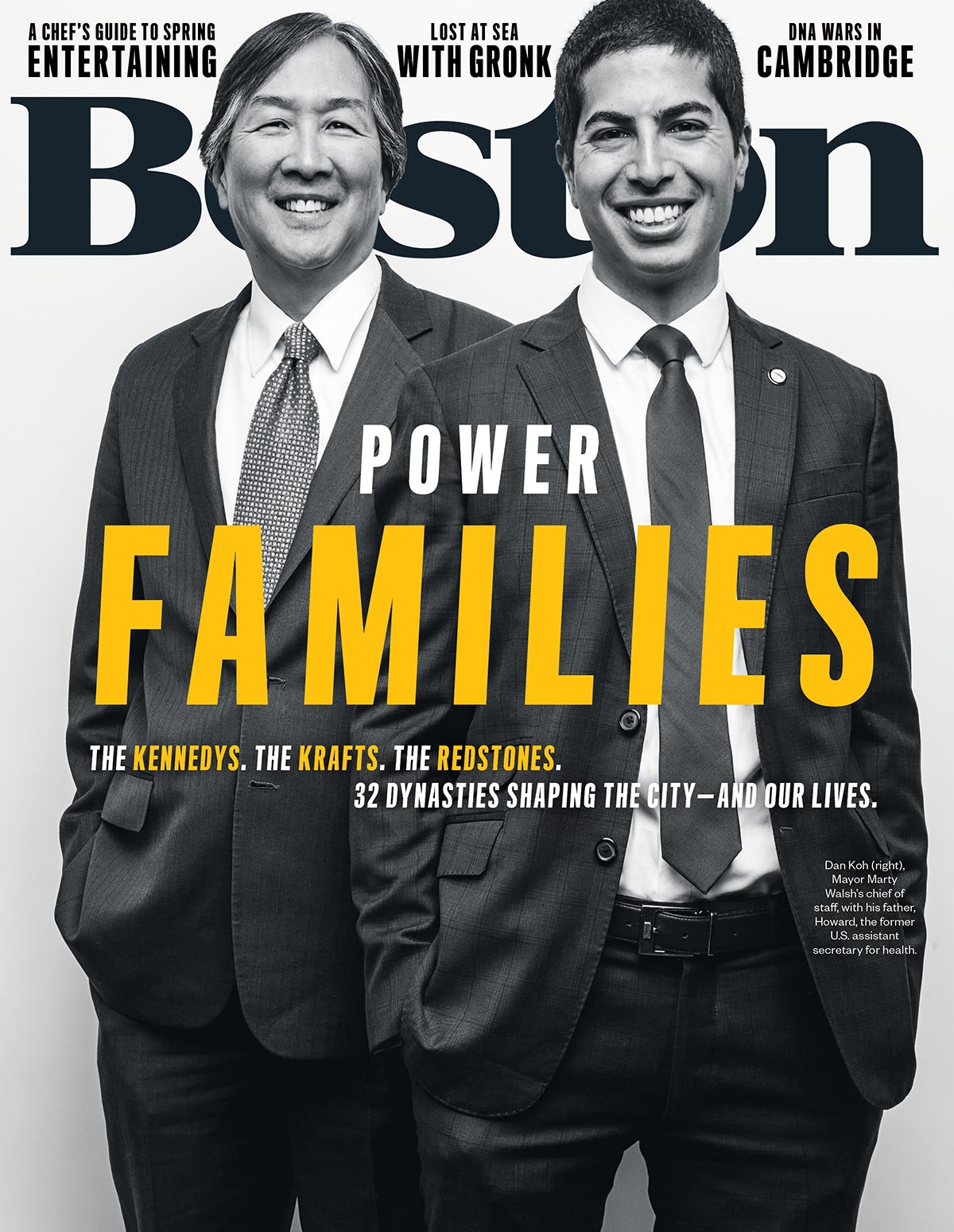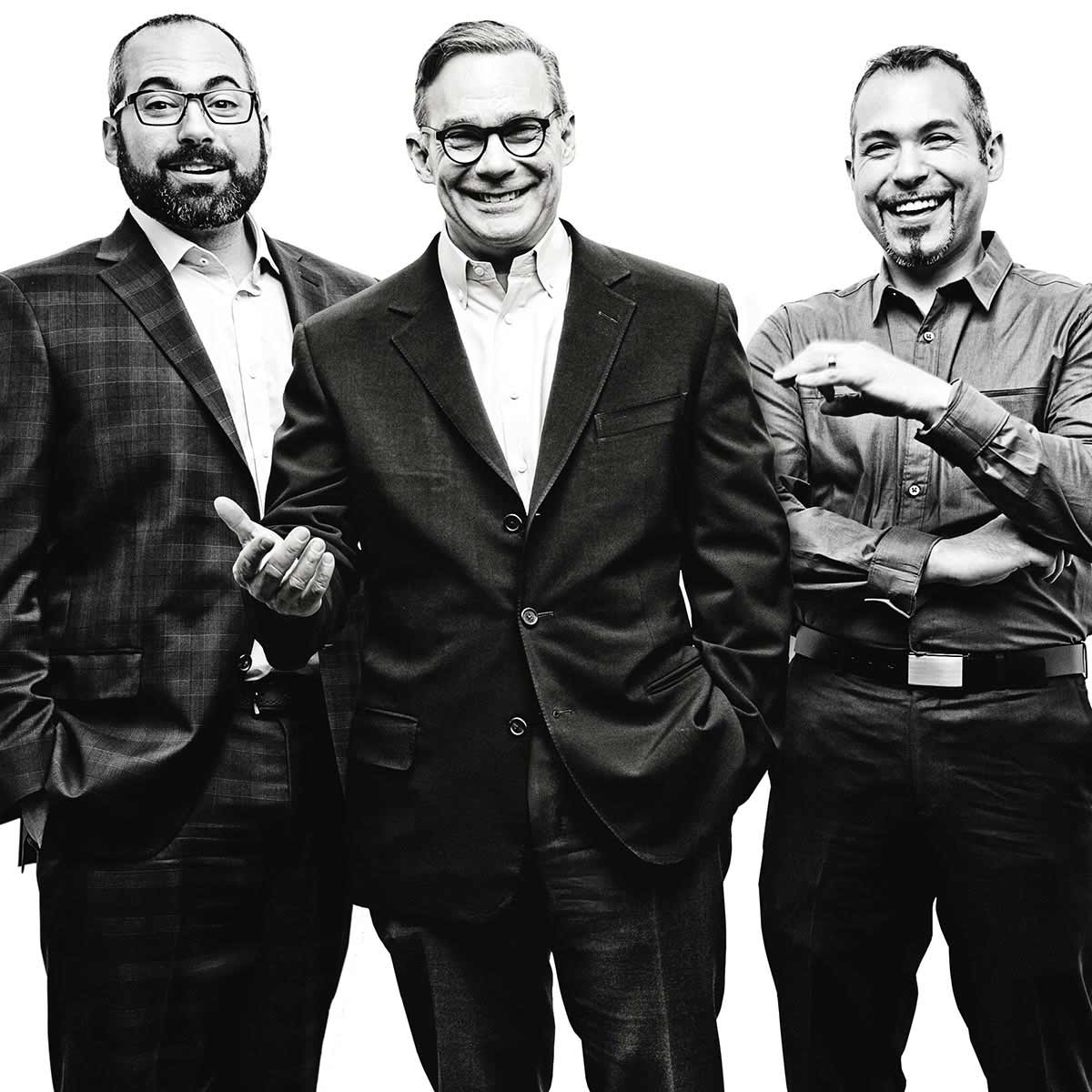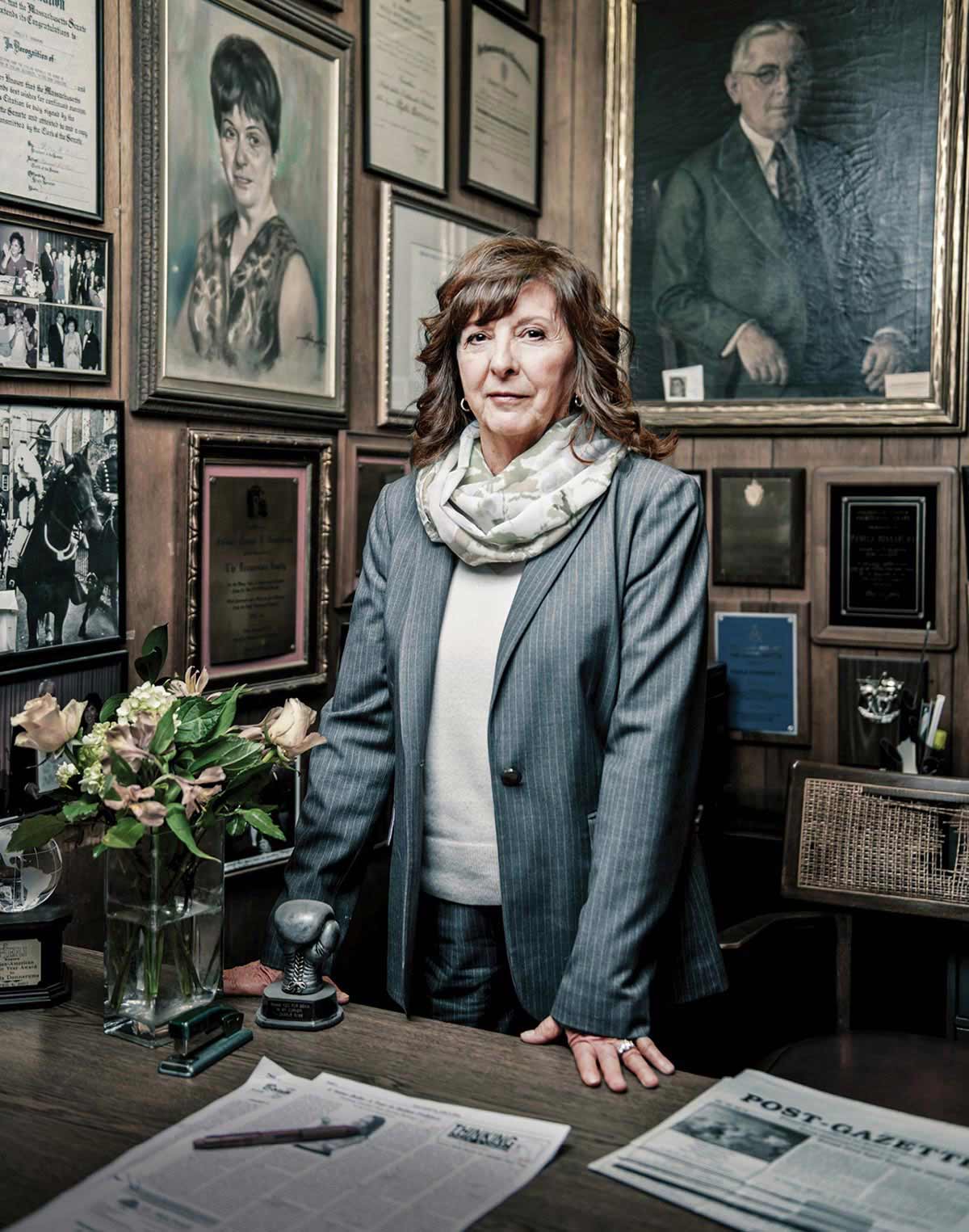Power 2016: Family Ties

Photograph by Webb Chappell
Too often, people talk about our city’s power players as an elite cabal of the über-rich. But in an ancient town like Boston, family names are worth far more than any Forbes ranking. Power, at its core, is about having a lasting voice that effects change, whether you were born into a stately Brahmin house or got your start pushing a souvenir cart outside Fenway. Many families on this list—all include at least two successive generations—first made their mark here decades or centuries ago: a rags-to-riches tale of launching a business just to stay afloat only to reach unimaginable heights. Today, we know those humble beginnings as empires built on the inherited wisdom, work ethic, and ambition passed down from generation to generation. From our biggest money movers and development moguls to our most dedicated public servants and media pioneers, here are Boston’s power families.
—Politics—
The Arroyos
Public Service
Felix G. Arroyo isn’t sure whether his passion for social justice is a case of nature or nurture. Most likely, it’s a little of both: Arroyo, the city’s chief of health and human services and a former Boston city councilor, spent his childhood tagging along with his father, Felix D. Arroyo, at community meetings and events. The elder Arroyo was the first Latino to become president of Boston’s school committee, the first to be elected city councilor at large, and the first to win a county office in Massachusetts, becoming register of the Suffolk Probate and Family Court in 2014. “I was filled with pride that my dad dedicated his life to opening doors that were not just closed, but sealed shut with Super Glue,” the younger Arroyo says. “When you follow someone who’s a first, you start to realize that as important as it is to be the first, it’s more important to not be the last.”
—Beauty—
The Barsamians
The Belgrade Group
When people ask Michael Barsamian what he does for a living, he tells them he’s a hairdresser. It’s true: The 69-year-old still snips customers’ locks every Saturday at his flagship Lord’s & Lady’s Hair Salon in West Roxbury. He just happens to own 26 other salons and spas across the region. Crown jewels include the upscale James Joseph salons on Newbury and at the W, Corbu at the Charles Hotel, and New York City’s Mizu—not bad for a son of Armenian refugees who started with only five salon chairs in 1971. These days, Barsamian is also dabbling in real estate, most recently a hotel development on Route 1, down the road from the proposed Wynn casino. If all goes well, Barsamian plans to relinquish his salons to his daughters and a son-in-law—though odds are he’ll still keep his weekly shift behind the chair.
—Real Estate Development—
The Beals
Related Beal
Five generations of Beals have shaped Boston’s skyline. Over the past decade alone, the family has had a hand in everything from the luxury Clarendon residential tower to the mixed-use Lovejoy Wharf development (home to Converse HQ); now they’re in the process of creating the city’s pioneering “workforce” housing complex, near North Station. But Bruce Beal Sr., the chairman of Related Beal, doesn’t want real estate development to be his family’s only contribution to the city—which is why he and his brother, Robert, invest in what they call “living legacies,” endowing the first curatorship of contemporary art at the Museum of Fine Arts as well as a teaching fellowship at the Angell Animal Medical Center. “It’s important to me to do things for the right reason,” Bruce says. “It’s not about having your name on a masthead or a list. And it’s very easy to write a check. What’s harder to give is your time. An institution is only as strong as its people.”

The Berkowitz Family, Legal Sea Foods On the Hook: The seafood empire’s head honcho, Roger (center), will likely one day pass the business on to his two sons, Matt (left) and Scott (right). / Photograph by Webb Chappell, Styling by Laura Dillon/Team
—Seafood—
The Berkowitz Family
Legal Sea Foods
Roger Berkowitz is thinking about coffee. The Legal Sea Foods president and CEO says he wants to bring the best brew in the world to his 34 restaurants, but the plan is hush-hush—at least for now. His focus on java might seem unexpected given that the Legal business is decidedly all about fish. But, Berkowitz says, “quality is in my DNA”—no matter what’s on the menu. In 1904 his grandfather Harry founded a grocery store in Inman Square; nearly a half-century later, his father, George, opened an adjacent fish market, followed by a fish restaurant to meet customers’ evolving needs. It was a lesson in adaptability that Berkowitz still considers essential today. “Where and how people are eating today is different, so we study that,” he says about the future of his dining empire. “Millennials and Gen X and Yers are different than aging boomers and seniors. It’s incumbent on us to be respectful and pay attention to that.” Bets on a fleet of Legal food trucks, anyone?

Ernie Boch Jr., President and CEO, Boch Enterprises Come on Down: The Boch family has outfitted generations of Bay Staters with new wheels. / Photograph by Webb Chappell, Styling by Laura Dillon/Team
—Automotive—
The Bochs
Boch Enterprises
Getting canned might have been the best thing that ever happened to Ernie Boch Jr.—mostly because it was at the hands of his father, who wasn’t too impressed with his management skills. “He called me in and fired me,” Boch says. “Fired me! Twice, actually!” It was just what the young Boch needed to find his groove as an auto salesman before eventually ascending to Automile royalty in Norwood (where he owns an estate apart from his homes in Martha’s Vineyard, Florida, and the West Indies). These days, though, the third-generation Boch auto empire looks a little different than it did in Ernie Sr.’s time: Junior recently unloaded Honda and Toyota from his portfolio, though he’s hanging on to Ferrari, Maserati, and his lucrative Subaru outfit. Those dealership sales, he says, will give him more time for his charity, the Music Drives Us Foundation.
—Sports—
The D’Angelos
’47 Brand
They call him the “Mayor of Fenway Park.” At 89, Arthur D’Angelo presides over every Red Sox home game and still works at his Yawkey Way souvenir store, greeting fans from his baseball-glove-shaped chair. It all started in 1947, when he and his twin brother, Henry—who emigrated from Italy when they were 12—started peddling Sox pennants outside the ballpark. Seven decades later, Arthur’s four sons now produce team hats, apparel, and souvenirs in partnership with the MLB, NBA, NHL, NFL, and more than 650 colleges. “When we were real young, we would go straight to Fenway after school, ready to work,” says co-owner Steven D’Angelo. “Though success can start from something as small as a souvenir cart, if you’re lucky enough to be surrounded by family who support your business…you’re already most of the way there.” Helping get the D’Angelos the rest of the way was Mayor Tom Menino, who christened a street adjacent to Fenway “Arthur’s Way” in 2013.

Post-Gazette publisher and editor Pamela Donnaruma doesn’t know what the future holds for her North End newspaper. / Photograph by Webb Chappell
—Media—
The Donnarumas
Post-Gazette
Pamela Donnaruma’s Italian-immigrant grandfather, James, founded La Gazzetta del Massachusetts in 1896, and her parents, Caesar and Phyllis, published it until she took over in 1990. The family-owned paper, which hasn’t skipped an issue in 120 years, is still the weekly voice of Boston’s Italian-American community. For decades, running it has been a labor of love. Donnaruma does it partly because the big papers won’t run the kinds of stories hers does—ones that focus on her community and emphasize positive news. Her father had a knack for using the paper to help Italian businesses succeed in a town that was rife with discrimination at the time. In fact, the last time Donnaruma stopped by Piantedosi Baking, she ran into the owner. “He said to me, ‘We still have it hanging on the wall—that story your parents did on my father,’” she says. “Do you know how good that makes [me] feel when you see how big [Piantedosi] has grown?”
MORE: Pamela Donnaruma on the Post-Gazette’s Uncertain Future
—Real Estate Development—
The Drukers
The Druker Company
Boston during the early 20th century could be tough for a Jewish businessman, says real estate titan Ron Druker: “Especially in those days [when] people were isolated from the community.” But Druker’s Scottish-immigrant grandfather, John, helped bridge that gap by earning the respect of powerful financiers such as the Bank of Boston, John Hancock, and “other institutions that maybe weren’t so friendly to people outside of their world,” Druker says. Notably, he developed the Braemore and Kenmore hotels, after which Kenmore Square is named, and helped found Beth Israel Hospital. Two generations later, his grandson Ron, who’s worth hundreds of millions of dollars, still runs the business on its sterling reputation, to the point that the Druker Company doesn’t have—or even need—a website. “We’ve been honored by people who know what we do and how we do it,” Druker says. “That’s thanks to the integrity of my grandfather.”
—Real Estate Development—
The Epsteins
The Abbey Group
The family that plays together stays together. Just ask the Epsteins of the Abbey Group, a development firm with a deep presence in the Fenway and Downtown Crossing. Whether they’re rooting on the Celtics at TD Garden (founder and CEO Robert Epstein is one of the team’s managing partners) or hitting the slopes in Vermont, where the clan owns homes next to one another, all of that bonding outside of the office has clearly paid off. The company now counts Fenway’s Landmark Center and Viridian tower—not to mention Downtown Crossing’s 45 Province luxury condos—among its most notable buildings. “We’re proud of those projects, and that we took an early interest in helping revitalize those neighborhoods,” says managing partner Audrey Epstein Reny. “We seem to find our best inspiration and do our best work when we are together.”


